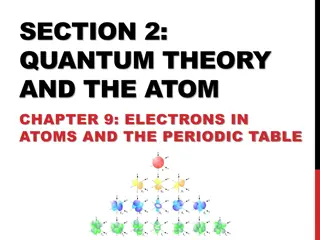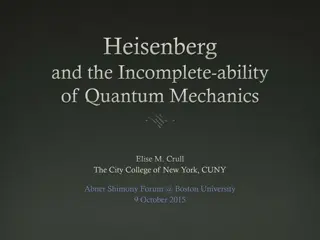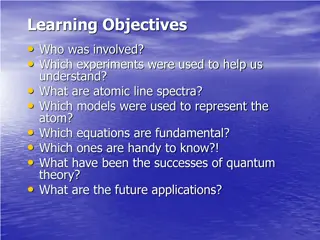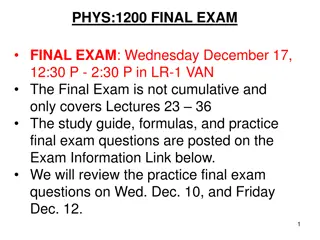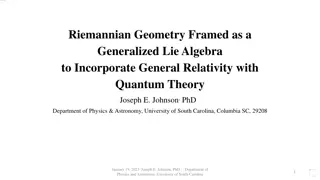Heisenberg's Uncertainty Principle in Elementary Quantum Mechanics
Heisenberg's Uncertainty Principle, proposed by German scientist Werner Heisenberg in 1927, states the impossibility of simultaneously and accurately determining the position and momentum of microscopic particles like electrons. This principle challenges classical concepts of definite position and m
0 views • 49 slides
Exploring Quantum Theory and the Atom: Electrons in Atoms and the Periodic Table
Delve into the fascinating world of quantum theory and the atom in Chapter 9, where we compare Bohr's model with the quantum mechanical model. Understand de Broglie's wave-particle duality and Heisenberg's uncertainty principle's impact on our current electron view. Discover the relationships among
0 views • 31 slides
DFG Funding Opportunities for Researchers: Doctoral and Early Postdoc Phases
German Research Foundation (DFG) offers diverse funding opportunities for doctoral researchers and early postdocs, supporting knowledge-driven projects, international collaboration, gender equality, and research careers. Eligible applicants hold a doctorate and aim to work in Germany, with positions
0 views • 19 slides
Heisenberg and the Incomplete Ability of Quantum Mechanics
A nuanced exploration of Heisenberg's role in the history of Modal Interpretations, revealing how he anticipates MIs. Discussions include contemporary views, Dieks' explanations on modal interpretations, and Heisenberg's stance on quantum propensities. The presentation emphasizes the transition from
0 views • 14 slides
Quantum Theory and Key Figures in Physics
Explore the evolution of quantum theory through the perspectives of renowned physicists such as Albert Einstein, Niels Bohr, Werner Heisenberg, Erwin Schrödinger, Prince Louis de Broglie, and Max Planck. Learn about atomic line spectra, fundamental equations, and models used to represent the atom.
0 views • 23 slides
Modern Physics Concepts in the 20th Century: Photons, Uncertainty, and Particle-Wave Duality
Modern physics in the 20th century blurred the lines between particles and waves, introducing concepts like photons, Heisenberg's uncertainty principle, and the dual nature of matter. Topics covered include the behaviors of electromagnetic waves, the photon concept, and the limitations of measuring
0 views • 23 slides
Incorporating General Relativity into Quantum Theory through Riemannian Geometry
Framing Riemannian Geometry as a Generalized Lie Algebra to combine General Relativity with Quantum Theory. The proposal extends Heisenberg Algebra to incorporate a more general geometry, allowing for a function of position in commutator relationships. The discussion covers historical developments,
0 views • 50 slides

